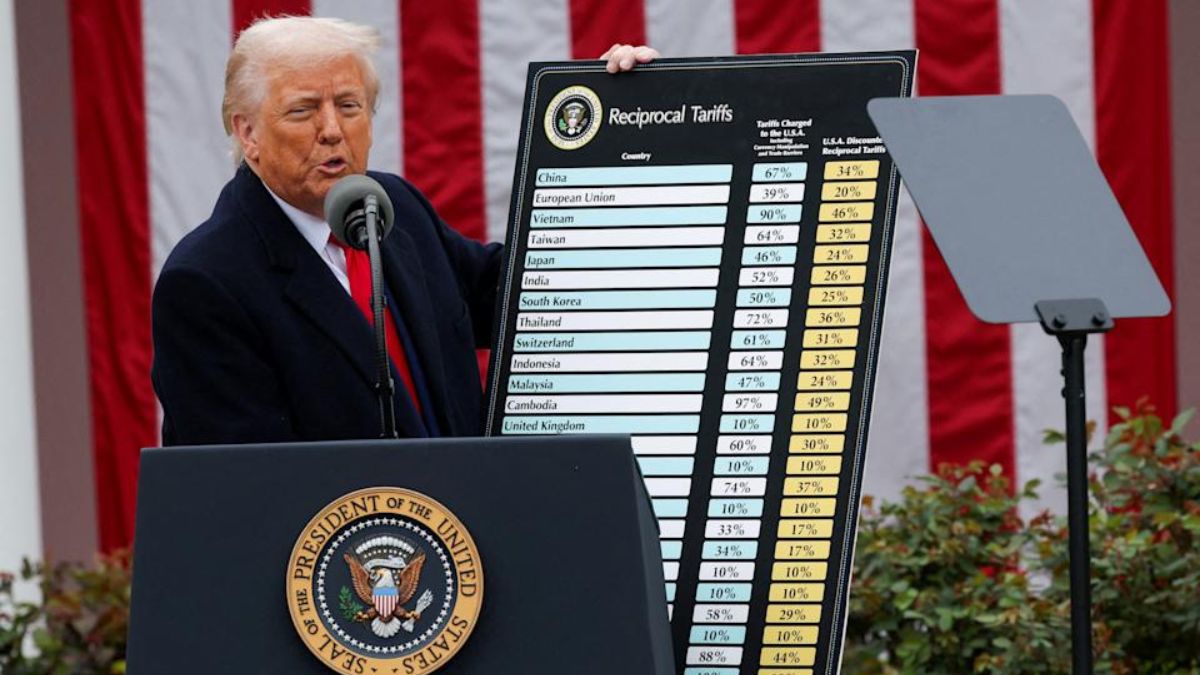While Wall Street had expected US President Donald Trump’s rollout of tariffs to be disruptive, they did not expect it to be so expansive and disruptive.
As Trump rolled out the most sweeping tariffs on Wednesday, stocks across the world tumbled and analysts reacted with shock over the extent over tariffs and fear over their impact on the economy.
Trump announced 10 per cent tariffs on all trade with the United States and slapped higher tariffs on a host of countries. He slapped Vietnam with 46 per cent tariffs, China with 34 per cent tariffs (on top of 20 per cent tariffs already in place), Taiwan with 32 per cent tariffs, India and South Korea with 26 per cent tariffs, and Japan with 24 per cent tariffs, among other nations and blocs.
At the time of writing, Nasdaq futures were down 3.2 per cent, Japan’s Nikkei 225 was down 2.9 per cent, and Hong Kong’s Hang Seng Index was down 1.3 per cent.
Read our full coverage of Trump’s rollout of tariffs here
Deutsche Bank Senior US Economist Brett Ryan told Yahoo Finance that Trump’s tariffs “were definitely worse than we had anticipated”.
Ryan said that they had expected tariffs to be within the range of 15-20 per cent, but the announcement suggests the overall effective tariff rate on all US imports to be in the 25-30 per cent range.
Notably, some of the worst-hit countries are US treaty allies and geopolitical partners, such as Japan, South Korea, and India, and even Israel that had removed all tariffs on US goods earlier this week.
Quick Reads
View All‘This is catastrophic for American families’
Echoing Ryan’s sentiment, Matt Priest, the CEO of Footwear Distributors and Retailers of America, said that they had hoped for a more targeted approach but the way Trump has gone about tariffs is “catastrophic for American families”.
“We had hoped the president would take a more targeted approach, but these broad tariffs will only drive-up costs, reduce product quality and weaken consumer confidence,” said Priest, according to The New York Times.
In a statement carried by The Times, the National Retail Federation said tariffs would “equal more anxiety and uncertainty for American businesses and consumers”.
ALSO READ: Trump’s tariff war could cost world $1.4 trillion, raise prices in US by 5%, finds analysis
The National Association of Manufacturers (NAM) flagged the uncertainty that the administration’ trade policy has generated and anxiety it has fuelled among businesspersons, with NAM President Jay Timmons saying that tariffs threatened “investment, jobs, supply chains and, in turn, America’s ability to outcompete other nations and lead as the pre-eminent manufacturing superpower”.
In a statement, NAM referred to a survey in March and said that trade uncertainties surged to the top of manufacturers’ challenges, cited by 76.2 per cent of respondents. Referring to another internal survey, NAM said that 87 per cent of small and medium-sized manufacturers indicated that they may need to raise prices, and one-third could slow hiring.
Nancy Lazar, the Chief Global Rconomist at Piper Sandler, estimates in the wake of Trump’s tariffs that growth in the second quarter may fall 1 per cent “because you’re going to be increasing prices more aggressively and it’s going to negatively impact the consumer space more than we had anticipated”, according to The Times.
Lazar had previously estimated stagnancy in the coming quarter but now she expects a clear decline.
ALSO READ: Wall Street doubles risk of recession ahead of Trump’s reciprocal tariffs
James Knightley, the Chief International Rconomist at ING, warned that these tariffs and subsequent retaliation from nations would “squeeze spending power” as well as hit corporate profits.
“That’s why you are seeing all of us revising down our growth forecasts,” said Knightley, as per The Times.
Even though markets have already started falling, Neil Dutta, the head of economics at Renaissance Macro, said that it was a surprise the fall was not sharper.
“It’s surprising stocks are not down even more. Perhaps investors assume cooler heads prevail later. I would not hold your breath,” said Dutta, according to Yahoo Finance.
)